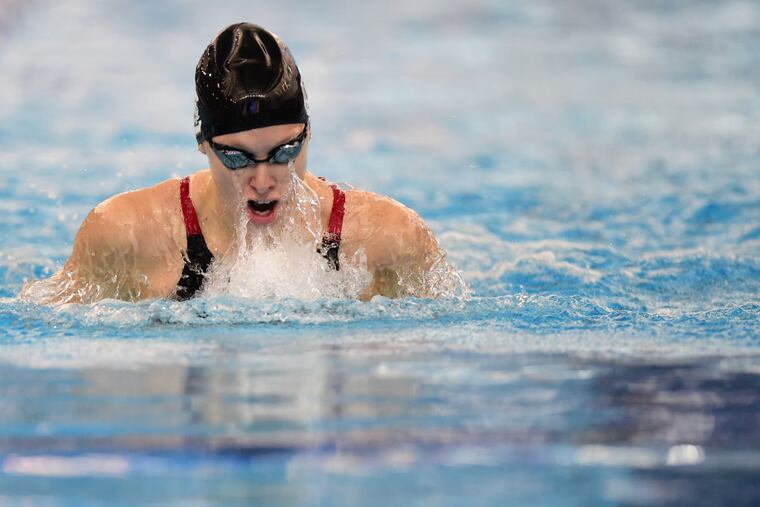Rachel Bernhardt credits a decision to swim at Drexel for her selection to Team USA
The hard work the former Dragons swimmer has done has finally paid off. But, Bernhardt attests that her journey toward reaching her full potential wasn't limited to just herself.

When Rachel Bernhardt chose to swim at Drexel, she thought that it was the highest level she could attain. As she prepares to represent the United States in the Olympics next summer in Paris, the true breadth of her abilities has now been realized.
“No, I was not surprised,” Bernhardt’s coach, Bob Groseth, for Team Charlotte, said of her making the team. “We were seeing in practice what she could do. We saw that she was constantly improving.”
But Bernhardt’s journey toward reaching her potential is not limited to just herself. The world-class athlete is also an occupational therapist at CaroMont Regional Medical Center in Gastonia, N.C., and uses the character she has built as a swimmer to improve the lives of her patients.
More impressive than her ability to balance these two pursuits is how she got there.
The Vineland, N.J., native started off playing first base for her school softball team while being raised in a household that had minimal contact with sports. Then came the day when a high school friend dared her to join the swim team. Bernhardt wasn’t going to shy away from a challenge.
It was from there that she fell in love with the sport.
During her junior year, Bernhardt began to ramp up the intensity of her training. She eventually got recruited to Drexel and arrived there in 2013, a decision she felt fully confident about.
“The more I visited Drexel, the more I got to know the people, and I ended up feeling I would just fit in,” Bernhardt said. “People wanted to help.”
Forever high-energy, Bernhardt knew she wanted to be in a big city and felt that Drexel and Philadelphia could provide her with everything. The high pace and loud surroundings didn’t intimidate her.
“I did want more of an academic push. ... I felt like [Drexel] could provide that because of the term system,” Bernard said. “I felt like I knew what it was like to work hard in the water, but I also wanted to work hard in the classroom.”
That work ethic translated well as Bernhard transitioned into becoming an occupational therapist.
Drexel’s co-op program gave her opportunities to work in both occupational and physical therapy.
While Bernhardt began to pursue her master’s in occupational therapy at a South Carolina satellite campus of Lenoir-Rhyne University in 2017, she worked as an administrative assistant for Gamecock Aquatics of the University of South Carolina. She deferred grad school initially because it overlapped with 2020, but then COVID-19 hit. So she woke up at 5 a.m. to train in the local pool and be at work by 8 a.m.
Someone could easily crack under the stress of such a busy schedule on top of training as a professional swimmer. But Bernhardt’s love of the sport and the people who helped her grow it kept her going.
“I do listen to my body — that’s the biggest thing,” Bernhardt said. “[I try to] not just pound an energy drink but actually find a solution. I’m very limited on social media, especially during big parts of the season. I always try to do something I enjoy every day, making an iced coffee, taking a bath, going on a walk.”
She gives a lot of credit to how her job has helped her as an athlete and how the people she sees every day push her when things get hard.
“I could have a bad practice and feel sorry for myself,” Bernhardt said. “But then I interact with my patients; they have a more complicated life than I do. A much more positive attitude than I do. I have to give myself a ‘woah, reality check, Rachel’ sometimes. [But] eight-hour shifts feel like two hours. They help me as much as I help them.”
As Bernhardt gets ready for the U.S. Open in November, she’ll take all the motivation she gets from her relationships with her patients with her. And of course, it all circles back to where it all began.
“It feels like Drexel,” Bernard said.
» READ MORE: Here's how head coach Mark Fetrow seemingly became the ‘perfect fit’ at Drexel men's soccer